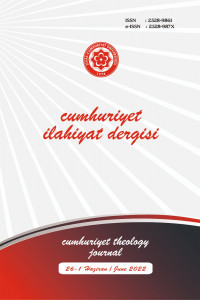Tevekkülün Fonksiyonelliği Üzerine -Din Psikolojik Bir Yaklaşım
On the Functionality of Tawakkul -Religion A Psychological Approach
Author(s): Fatih KandemirSubject(s): Theology and Religion, Individual Psychology, Qur’anic studies, Psychology of Religion
Published by: Cumhuriyet Üniversitesi İlahyat Fakültesi
Keywords: Psychology of Religion; Religion; Religiosity; Tawakkul; Functionality of Tawakkul;
Summary/Abstract: The aim of this study is to discuss the functional value of tawakkul in terms of individual psychology in the light of scientific studies. As known, tawakkul is an important concept on which the Qur'an and Sunnah have emphasized. In this regard, tawakkul, which is a religious value, is expected to have an important function for the individual in his work and actions. However, it is seen that tawakkul, which is fostered by religious sources, is far from its functional value that has been expressed in time. This situation often brings with it the questioning of this concept. Because this concept, which is based on religion, is expected to have a positive function for the individual, but on the contrary, it is known that it produces the opposite function for some individuals. It is possible to say that many factors are effective in the fact that tawakkul has such a function. However, due to the limitations of the study, it is not possible to discuss all these factors here. However, it can be stated that a false perception of destiny is a very strong factor in the development of individuals' belief in tawakkul contrary to the essence of religion. Thus, it is possible to say that the false understanding of tawakkul, which is also expressed as a kind of fatalism, develops and takes root. It is almost inevitable for this situation to lead the individual to a behavior contrary to the religious teachings, neglecting the principle of after fulfilling the reasons, one of the most important elements of tawakkul. Despite this, it is known that tawakkul still has many functional values in accordance with the essence of religion for the believer. In this context, five basic functions of tawakkul were examined in this study. In this context, first, the subject of Tawakkul as the Manifestation of Confidence in Allah was examined. At this point, it is emphasized that religion, which has the function of satisfying the individual emotionally, should cooperate with trust, as well as with many emotions in the emotional spectrum, in order to produce this function. It is possible to say that tawakkul has a very close relationship with this feeling because of the strong relationship between trust and faith. Because the feeling of trust in Allah creates expectations based on trust in people, it is possible to say that the level of trust of the individual who is fed by this feeling will also increase. The second, the function of tawakkul was examined under the title of Tawakkul as a Positive and Cognitive Re-evaluation Tool. In this context, it is emphasized that it is inevitable for a person to encounter positive life events as well as negative life events as a necessity of his existence. Afterward, it has been mentioned that this bipolar structure of existence causes the person to experience negative emotions as well as positive ones. At this point, after subjecting the situation to a positive and cognitive re-evaluation process, the individual who has tawakkul takes the strength from the verse "God only obliges a person to do what he can do" (al-Baqara, 2/286) and transfers the result to Allah, is likely to do so. The third, the function of tawakkul is discussed under the title of Tawakkul as a Means of Making Sense of the Background of Events. In this context, the attitude that an individual will adopt if the work he has entrusted to God outwardly produces a result against him: "It may be that something is good for you, but you do not tolerate it. It also happens that when something is bad for you, you love it. Allah knows, you do not know” (al-Baqara, 2/216). Accordingly, thanks to the awareness of tawakkul fostered by this and similar verses, it becomes very easy for the individual to accept negative situations without questioning too much and thus to make sense of the background of the event. The fourth, the function of tawakkul is examined under the title of Tawakkul as a Means of Spiritual Development. In this context, it has been pointed out that tawakkul has an important function for the spiritual development that religion has presented to him on the basis of meaning and purpose, aside from escaping from the troubles experienced by the individual. The last, the function of tawakkul mentioned in the study was examined in the context of Tawakkul as a Mental Shelter. Accordingly, tawakkul, which means an individual's relyıng on Allah, is an individual's action with the awareness that the only being with power and strength is Allah. Thus, an individual who is aware of his own helplessness is expected to rely on Allah, which he sees as a safe mental shelter, by trusting in Allah in all matters, by showing sincere consent and submission to His will. Based on all these, it is aimed that this study, which was made by making use of primary and secondary sources, contributes to the understanding of the functional value of tawakkul, which is fostered by religious belief.
Journal: Cumhuriyet İlahiyat Dergisi
- Issue Year: 26/2022
- Issue No: 1
- Page Range: 121-134
- Page Count: 14
- Language: Turkish

